There are more than a few compelling reasons to visit the East Asian island nation of Taiwan: super welcoming locals, the best night markets in Asia, excellent public transportation, alluring landscapes, and, recently, a commendable handling of the pandemic.
When noting Taiwan’s compact size on the map, you may think one week is enough.
However, once you start planning your trip, you’ll soon be overwhelmed with options and find yourself struggling to decide what to include or leave out.
Table of Contents
Taiwan Itinerary – 7 Days
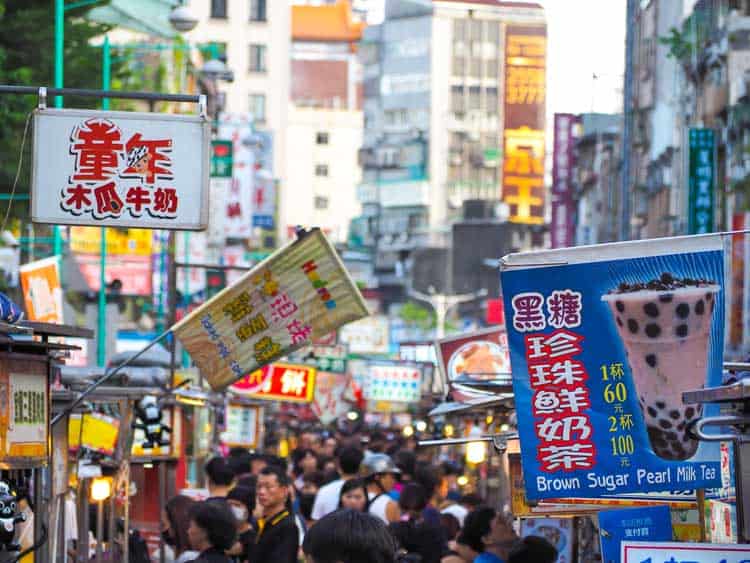
Below I’m going to cut to the chase and give you a 1 week Taiwan itinerary that takes in the best of the country’s cultural, historical, artistic, culinary, and scenic wonders in the most efficient way possible.
This is a tried-and-tested route that I’ve developed after over 10 years of living in and traveling around Taiwan.
From the steaming thermal waters of Beitou Hot Spring to an epic sunrise above a sea of clouds at Alishan National Scenic Area, you’ll have all the makings of the trip of a lifetime!
Taiwan Itinerary Highlights
This Taiwan one-week itinerary assumes you’ll have seven complete days to work with.
- Days 1 and 2 are spent exploring the mesmerizing capital, Taipei City, while day 3 involves a multi-stop day trip from the city.
- Day 4 takes you down to artsy Taichung.
- From there, you’ll venture to stunning Sun Moon Lake on day 5.
- And on to the misty mountain resort of Alishan on days 6 and 7.
From there, you can circle back to Taipei, or head directly to Taoyuan Internation Airport.
Day 1 – Taipei Itinerary and City Explorations
Welcome to Taiwan! Your first day in Taipei shall be devoted to covering some of the city’s must-visit attractions.
You’ll be relying entirely on the excellent MRT to get around Taipei.
Make sure to pick up an EasyCard at any MRT station for swiping in and out of all public transportation. You can get the TWD100 deposit back at the end of your trip.
Elephant Mountain & Taipei 101
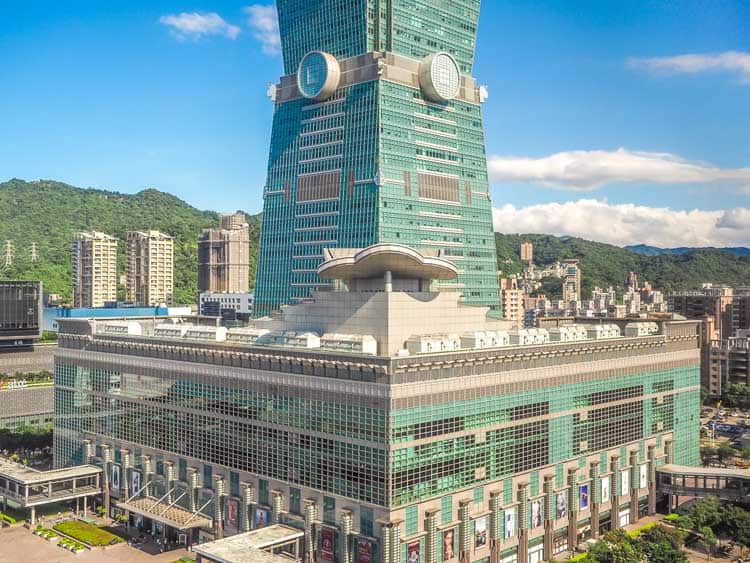
To kick start your day and get oriented, you’re going to hike to the summit of Elephant Mountain in eastern Taipei City.
If that sounds daunting, put your worries aside! The trail entrance is a short walk from Xiangshan MRT Station, and it only takes about 20 minutes to reach the top.
Reaching the lookout point, your mouth will literally drop. This is hands-down the best view of Taipei, the place where postcards are shot.
Towering Taipei 101 dominates the view, but from here you can see all the way to neighboring New Taipei City.
Once you’ve snapped enough photos, head back down the mountain and walk to the base of Taipei 101, once the world’s tallest skyscraper.
Ride the fastest elevator in the world to the 89th\ to 91st– floor Taipei 101 Observatory for another incredible, yet completely different perspective of Taipei.
Need lunch in an air-conditioned setting? The food court on B1 of Taipei 101 has several decent options.
- Read: Ten Thousand Buddhas Monastery of Hong Kong -Another epic View in Hong Kong
Chiang Kai-Shek Memorial Hall
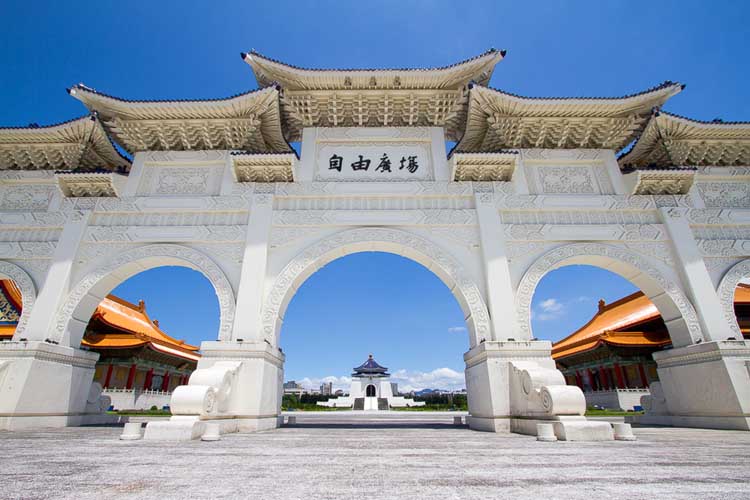
A quick hop on the MRT will bring you to CKS Memorial Hall, the city’s most impressive historical landmark.
The enormous blue and white monument honors the first president of the Republic of China (Taiwan’s official name; it’s complicated…)
The monument stands in expansive Liberty Square, flanked by two classical Chinese buildings: National Concert Hall and National Theater.
Don’t miss the view from the Liberty Square Arch at the western end of the square.
Beitou Hot Spring
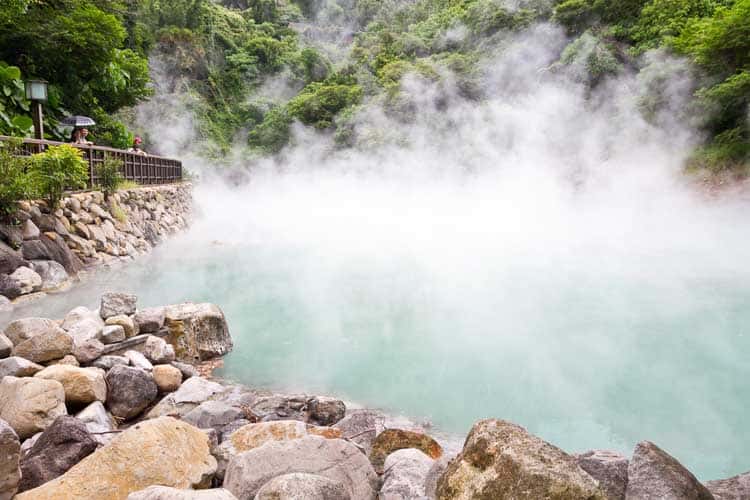
Now that you’ve done a fair share of walking, its time to kick back and soak in some thermal hot spring water.
Even if you’re visiting in the hotter months (May to September), press on, as there’s going to more to it than that.
Beitou is Taipei’s only hot spring, and the only one that is metro-accessible in all of Taiwan.
The hot spring was first developed by the Japanese during their colonial occupation of Taiwan (1895-1945), and today Beitou retains a thoroughly Japanese feel, with historical wooden bathhouses, a Japanese temple, and other landmarks harking back to the era.
Besides soaking in one of the many hot spring facilities, ranging from budget-friendly Beitou Public Hot Spring to high-end luxurious spas, you can also walk through Beitou Hot Spring Park, get enveloped in the mist at Beitou Thermal Valley, or learn about the area at Beitou Hot Spring Museum, housed in the original Japanese bathhouse.
Don’t leave without trying hot spring ramen and hot spring eggs!
Day 2 – Taipei Cool Neighborhoods and Attractions
There’s still a lot more to see in Taipei before you get out of the city. On day two you’ll round out your Taipei experience with some cultural attractions and cool neighborhoods.
Longshan Temple
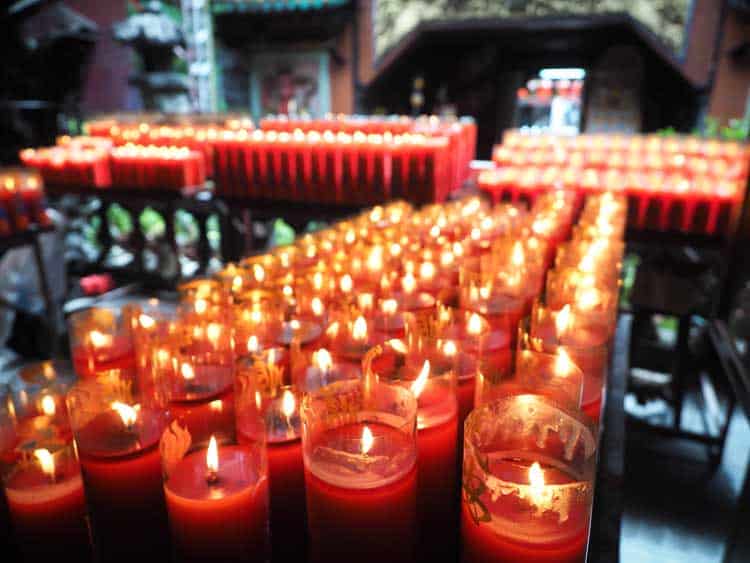
Get up bright and early to witness the mesmerizing chanting ceremony at Longshan Temple, Taipei’s most famous temple, in Wanhua (the oldest section of Taipei). The ceremony begins at 6 a.m. and again at 8 a.m., with both lasting nearly an hour.
Serious temple aficionados can also track down other historic temples in Wanhua including Qingshan Temple, Qingshui Temple, and Taipei Tianhou Temple.
North Gate & Dihua Street
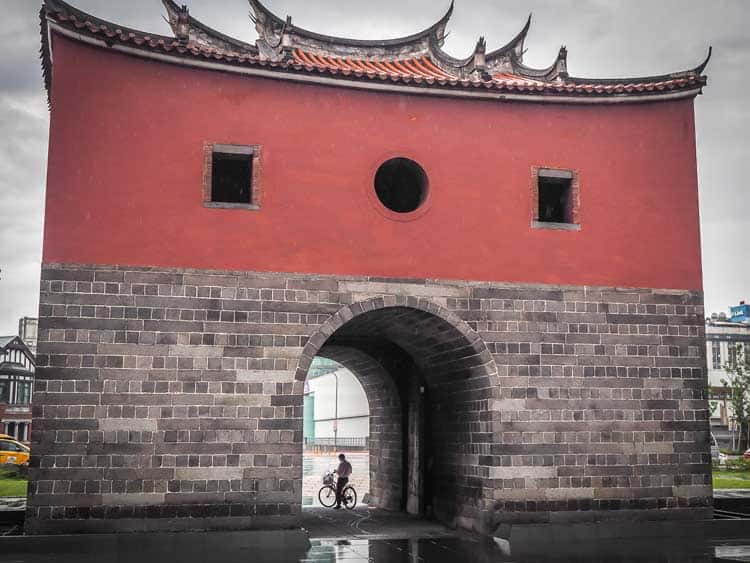
Ride the MRT two stops from Longshan Temple to Beimen (North Gate) station. Take a moment to admire, and walk right under Beimen, the only of the original five historic gates to Taipei City that still looks like it did in the Qing Dynasty.
From there, walk a few blocks to Dihua Street in historical Dadaocheng neighborhood. The street is said to be the oldest in Taipei, and it remains a center of trade in traditional goods, just like it has been since the founding of Taipei.
Walk the entire length of the street, exploring ancient teashops, traditional Chinese medicine dispensers, fabric markets, temples, local food stalls, and more.
Ximending Youth Shopping District
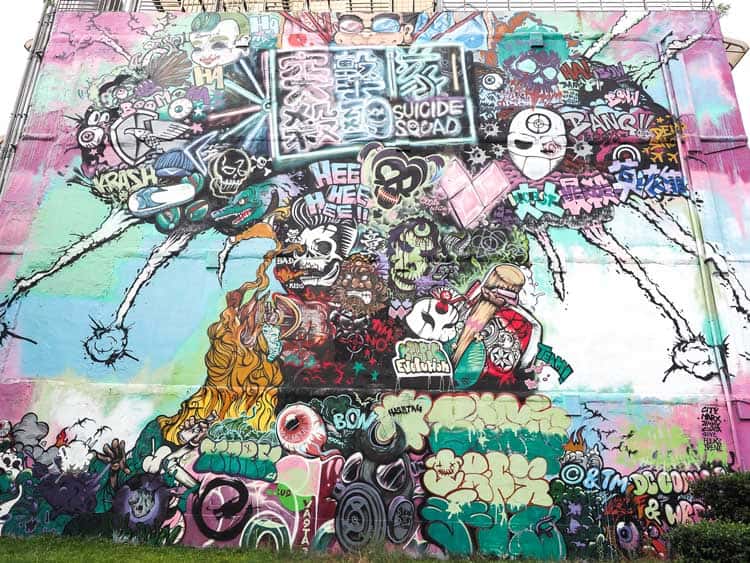
Return to Beimen and walk (or backtrack one stop on the MRT) to Ximending.
We’ve purposely saved Taipei’s hippest neighborhood for later in the day, when things have started to get going.
Often called the “Shinjuku of Taipei”, the pedestrian-only neighborhood features cosplay cafés, claw machine arcades, bubble tea galore, an open air tattoo street, a toilet-themed restaurant, and some of the best street art in all of Taipei.
Pause for an afternoon cocktail at one of many patio bars beside Red House, a Japanese-era theater-cum-craft & design market. This patio bars are the center of the LGBTQ+ scene in Taipei. A fun craft market is also held here on weekends.
Raohe Night Market
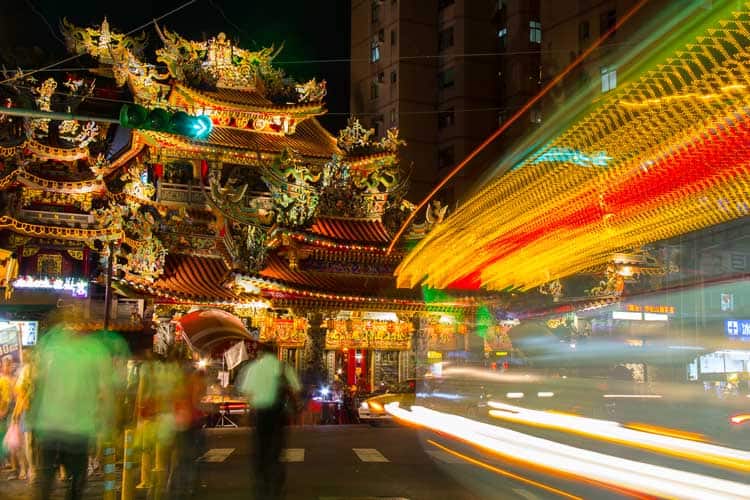
While tourists usually make their way to Shilin Night Market, Taipei’s largest and most famous, you’ll be better off trying Raohe Night Market, with its more manageable size and local feel.
Besides all the incredible food on offer, including a few stalls featured in the Michelin Taipei Guide, you can also marvel at Songshan Ciyou Temple, one of the most beautiful and intricate temples in Taipei, near the eastern entrance to the night market.
5:00 is a great time to arrive at the market, before it gets too busy in the evening.
Day 3 – Epic Day Trip from Taipei
Just like Taipei offers a staggering number of worthwhile sights and activities, there is also an endless number of day trip possibilities. Here you’ll learn how to combine four of the best ones in a single day trip from the city.
Shifen Waterfall
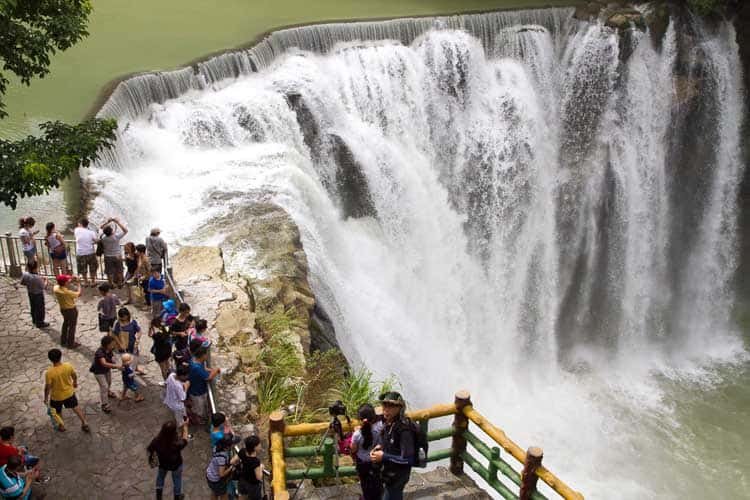
Shifen waterfall is the widest waterfall in Taiwan and is a sight to behold. Getting there is half the fun, too.
Ride the TRA train from Taipei Main Station to Ruifang, where you’ll transfer onto the small-gauge Pingxi Line to Shifen station.
Many visitors like to set off sky lanterns with wishes written on them from the narrow station. From there, it’s a short walk to the waterfall.
Jiufen and Jinguashi
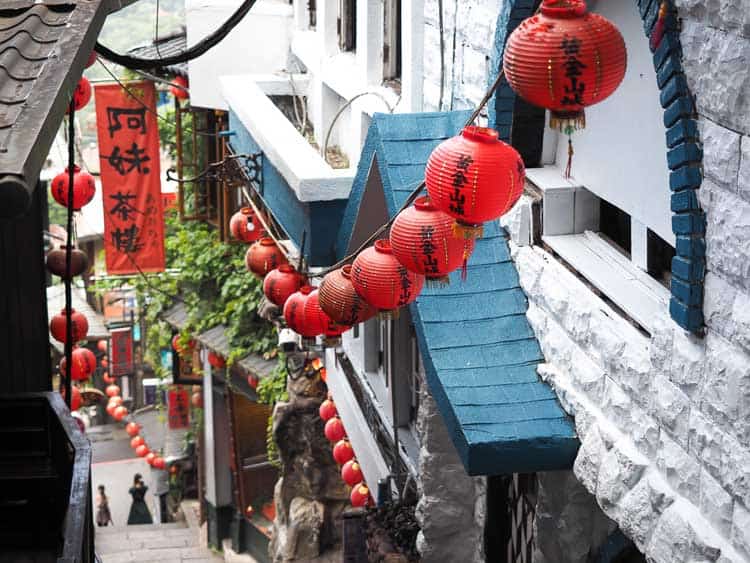
Jiufen is a mountaintop former gold mining boomtown transformed into popular market street.
Here you’ll enjoy incredible views down to the sea, traditional teahouses, and local specialties such as taro and sweet potato balls. To get there from Shifen, ride the Pingxi train back to Ruifang then transfer onto a bus.
Just a few bus stops past Jiufen, Jinguashi Gold Ecological Center is the site of one of the original gold mines.
It’s a great and less crowded add-on to Jiufen, where you can learn all about gold mining and enjoy more breathtaking views.
Keelung Night Market
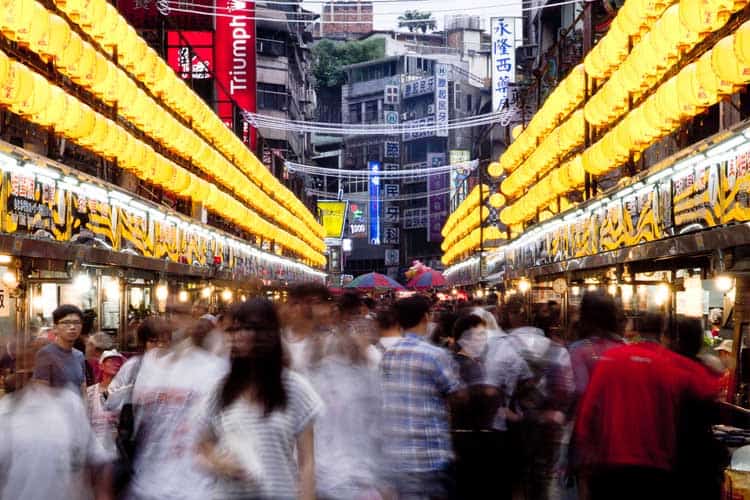
Keelung is Northern Taiwan’s largest port, but the main reason you’re coming here is to have dinner at one of the best night markets in all of Taiwan.
The photogenic market is lined with yellow lanterns, and every stall has its specialty written in English.
To get there from Jinguashi, ride the bus back to Ruifang Station, then hop on a train bound for Badu, from where you’ll transfer to a Keelung train. After your night market feast and a stroll by the harbor, it’s an easy 40-minute train ride back to Taipei.
Day 4 – Taichung City
Taichung is the largest city in Central Taiwan, and a nice addition to your Taiwan itinerary for its artistic attractions, not to mention it is the stepping-off point for the attractions in the days to follow.
Rainbow Village
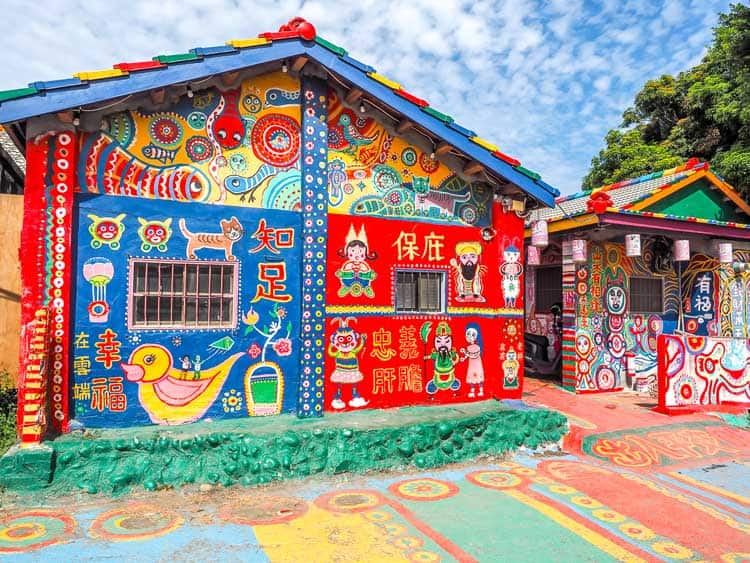
The top reason for coming to Taichung is Rainbow Village, a former military dependents village courtyard home that has been transformed into a psychedelically colorful outdoor museum.
“Rainbow Grandpa” an elderly ex-KMT soldier, painted the walls to save his home from being bulldozed, and he can still be seen there maintaining the walls today.
After visiting Rainbow Village, head to the Taichung Train Station area and explore the area on foot. Check out Animation Lane, Totoro Bus Stop, Miyahara Ice Cream, and Natural Way Six Arts Cultural Center.
Insider Tip: Rainbow Village is quite a ways from the Taichung City Center and Taichung Station. To save time, take the High Speed Rail (HSR) from Taipei to Taichung, which gets you there twice as fast, plus the HSR station is closer to Rainbow Village than the regular train station.
Gaomei Wetland
On the coast of Taichung, this wetland area has a series of boardwalks that provide access to tidal flats. Huge wind turbines add to the atmosphere. Try to time your visit with sunset, as they tend to be gorgeous here.
Feng Chia Night Market
Finish off your day at Taichung’s largest and most popular night market.
Day 5 – Sun Moon Lake
The jewel of the Central Mountain Range is Sun Moon Lake. A bit of a tourist magnet, the lake is nevertheless stunningly and is home to one of Taiwan’s smallest aboriginal tribes.
Regular buses from various points in Taichung take 90 minutes to reach Sun Moon Lake. You’ll arrive at Shuishe, the main village on the lake, where most hotels are found. From there, you can catch a lakeside bus to the below sights.
Wenwu Temple
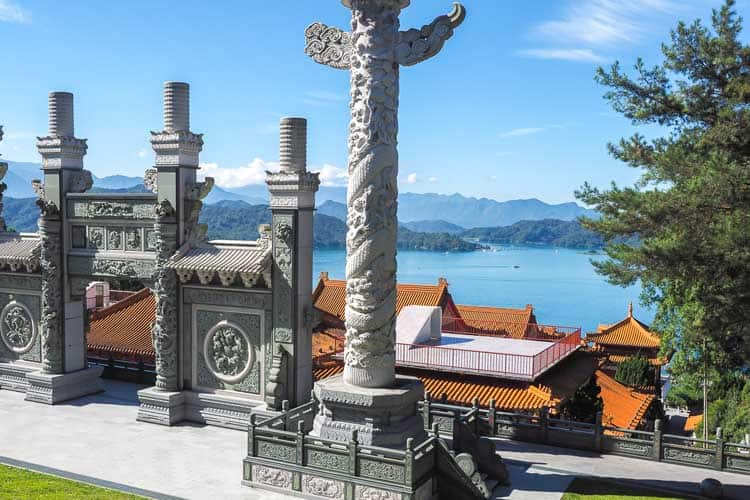
The most beautiful views of Sun Moon Lake can be enjoyed from enormous Wenwu Temple. Climb up into the depths of the temple until you reach the best lookout point at the top; you won’t be disappointed.
Sun Moon Lake Ropeway
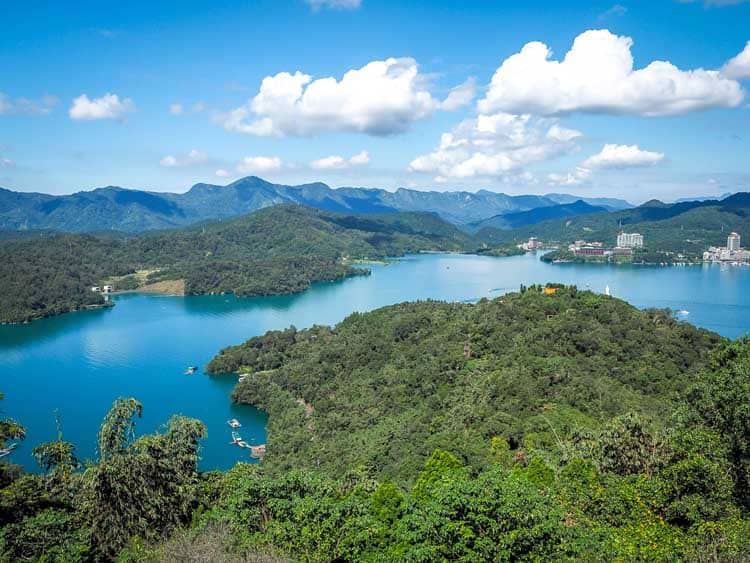
The Sun Moon Lake Cable Car ascends rapidly and givers riders unparalleled lake views.
At the top, it connects to a second cable car that descends the other side of the mountain to Formosan Aboriginal Culture Village, an amusement park meets aboriginal culture center.
If you’re looking for an authentic aboriginal experience, give it a miss. In March, however, blooming cherry blossoms on site make it worth the visit.
Ita Thao Village
Another village on the lake is Ita Thao, home to the Thao aboriginal tribe, which only numbers around 600.
While this is a more interesting place to stay than Shuishe, you’ll probably want to stick to the latter so you can catch your early bus to Alishan tomorrow.
Ita Thao is less touristy than Shuishe, and there’s a great day and night market along the main road to the lake, featuring aboriginal delicacies and Taiwanese snacks.
Catch a performance at Thao Tribe Performance Center for a more authentic experience.
Insider Tip: Besides the bus, you can also ride a ferry between Shuishe and Ita Thao villages. There’s also a third ferry stop on the lake, Xuanguang Temple, from where you can see Lalu Island, a sacred aboriginal burial ground on the lake.
Day 6 – Sun Moon Lake to Alishan National Scenic Area
You’ll need to get up a little early to catch the bus from Sun Moon Lake to Alishan. Don’t miss it, as there are only two per day!
Sun Moon Lake to Alishan Bus Ride
Minibuses depart from Shuishe village to Alishan only twice per day, at 8 a.m. and 9 a.m. You can usually buy tickets upon boarding, but it’s best to inquire the day before.
The ride to Alishan takes four hours. The drive is quite winding but also very scenic.
Alishan National Scenic Area
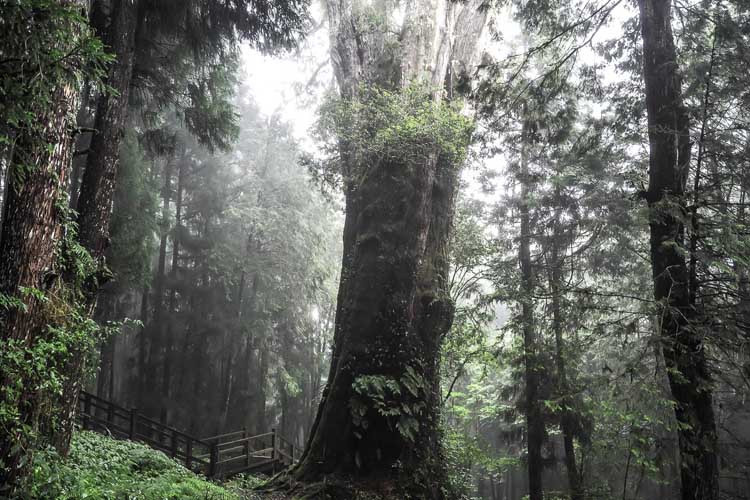
The final stop on this Taiwan seven-day itinerary is Alishan National Scenic Area, the country’s top mountain resort.
Alishan is famous for several things: sunrises, cherry blossom viewing in April, giant ancient cypress trees, and some of the best oolong tea in the world.
Check into your hotel, pick up a hiking map from the tourist center, then head out for an afternoon of hiking amongst the giant trees.
Yet another highlight is you get to ride the Alishan Forest Railway, a small train line originally built by the Japanese for logging the area.
When dining in the tourist village after your hike, make sure to try the locally grown fresh wasabi served with tofu.
It’s extremely flavorful and lacks the overpowering bite of the sushi wasabi you are probably used to.
Insider tip: There are no hostels at Alishan, and a rather poor selection of regular hotels. Book far in advance to guarantee a room, especially if visiting on a weekend or holiday. During cherry blossom season (late March to early April), it can be almost impossible to get a room.
Day 7 – Sunrise Above a Sea of Clouds
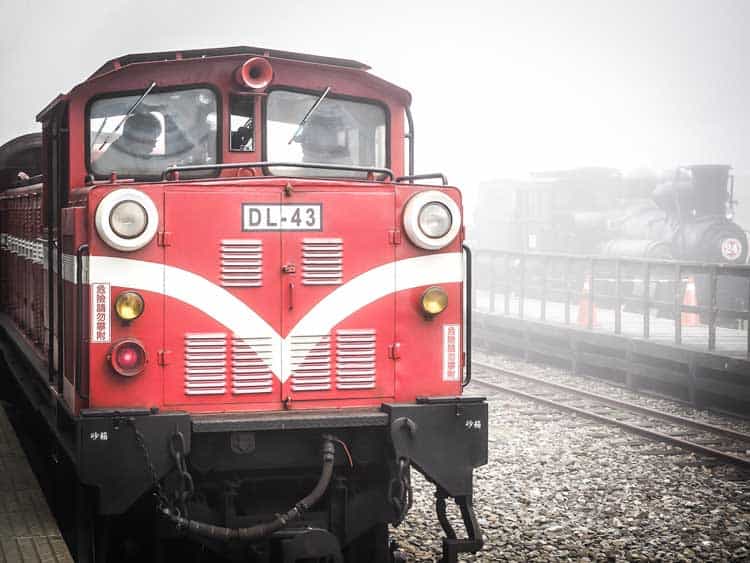
Set your alarm extra early to ride the Alishan Forest Railway up to the sunrise lookout point.
- You’ll need to reserve your tickets at the Alishan Railway Station the day before. Departure times change according to the time of the sunrise.
The reason everyone is willing to get up so early is for a chance to witness the spectacular phenomenon the sun rising above a sea of clouds in the valley below. You’ll need a bit of luck, though; out of a half dozen visits to Alishan, I’ve only seen it once.
Since you’ll be up so early, you’ll still have time to do some morning hiking before checking out of your hotel.
To get back to Taipei, the fastest option is to take a bus from Alishan to the Chiayi High Speed Rail station (four departures per day) and transfer to the HSR.
If you’re going directly to the airport, you can ride the HSR to Taoyuan station and transfer to the airport shuttle bus.
The slower but cheaper option is to take a bus from Alishan to Chiayi Train Station (roughly every hour) and then take the regular train or bus to Taipei.
I hope you’ve found all the information for planning a fantastic one week in Taiwan. Let us know how it goes in the comments below!
Read About More Great Destinations in Asia
- 7 alternative Things to do in Taipei
- Things to do in Hong Kong – The Complete Travel Guide
- The best things to do in Beijing China
- 24 Top Things to Do in Shanghai, China in 2020
- The 35 Best Things to do in Tokyo, Japan
- 13 Things to do in Nanjing China – A Complete Guide to the Ancient Capital
- 25 Things to do in Suzhou China – All You Need to Know Before you Go
Did you enjoy this Taiwan Itinerary? Save it to Pinterest for your future travel planning.
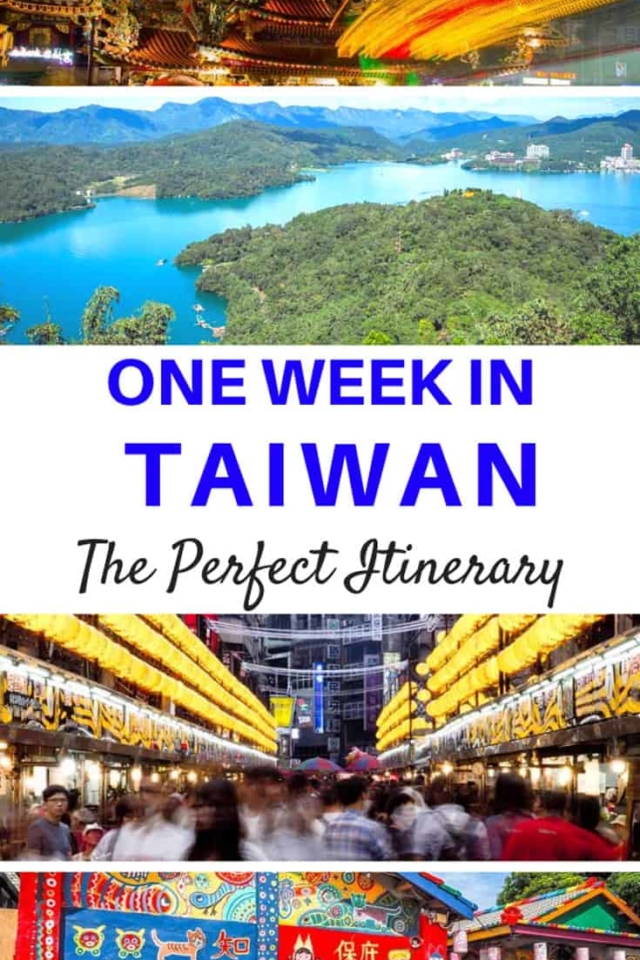

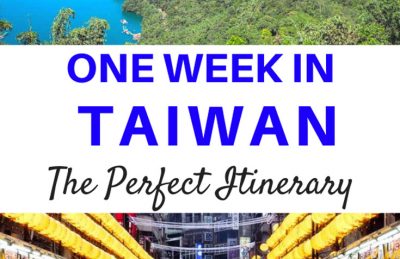
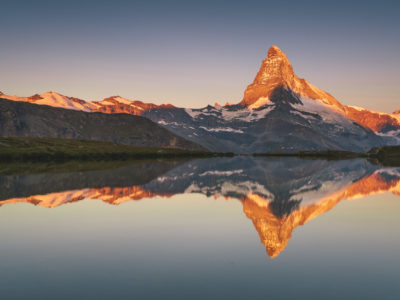
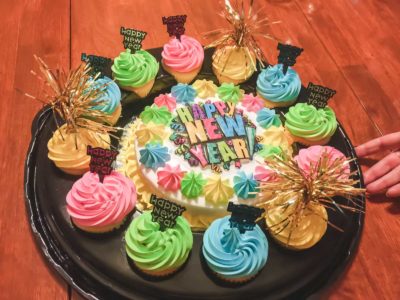

Many thanks
I would love to travel to Taiwan!!!
What a great article you have here. This is very helpful! I haven’t visited Taiwan so I will add it on my bucket list! It looks like a beautiful place. When it’s safe to travel again, I really want to go there. I’ve heard a lot of great things to do there. Thanks for sharing your experience!
I lived in Taiwan too, back in the mid 70’s, very time I go back to Taiwan it’s like going home, Taiwan is a great place to travel I like Taiwan better than mainland China.